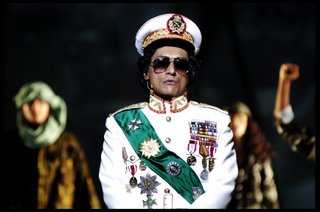 The show “Gaddafi: A Living Myth”, which burst last week onto the stage of the Coliseum Theatre in central London, has left critics perplexed.
The show “Gaddafi: A Living Myth”, which burst last week onto the stage of the Coliseum Theatre in central London, has left critics perplexed.Is the show a questionable glorification of a dictator with much blood on his hands? Or is it a commendable experiment in political theatre, mixing the music of the electro-rap band Asian Dub Foundation, Middle Eastern musicians and the ENO orchestra with rap and dance in order to elucidate the contradictory aspects of a leader who has survived for 37 years through a series of extraordinary volte-faces?
Critics have also tied themselves in knots trying to decide whether the piece, directed by the Australian opera director David Freeman, is an opera, a musical, a hybrid of both or a new form. The text of the libretto by Shan Khan is mostly shouted over the music rather than sung like opera.
The show was initiated by Asian Dub Foundation member Steve Chandra Savale who has long been fascinated by the Libyan leader. It had a three-year gestation period and is receiving only six performances. The show is certainly a spectacle, with its its rousing, churning sound track and its gyrating female bodyguards in camouflage uniform performing robotic and kick-boxing dance routines.
Actor Ramon Tikaram struts the stage as an intense, energetic Gaddafi (even if somewhat lacking in the height department). Film, photographs and graphics projected onto a screen behind the actors depict major political events.
The opening night last Thursday received generally poor reviews. The Guardian gave it only one star out of five and said it was “never more than a hodgepodge of musical and cultural influences”. The Evening Standard gave it two stars, describing it as a “bizarre theatrical experiment”. Bloomberg critic Warwick Thompson was angered and depressed by the piece and its “tiresomely predictable” anti-Americanism.
When I went to see the show on Saturday night I found it an interesting theatrical and musical event, despite its flaws. The auditorium was packed, partly because some tickets (which normally cost £32 to £49) had been made available at the bargain price of only £10 through special offers such as those from the Guardian, and the London Middle East Institute. The audience seemed to enjoy the show and its humor, and applauded it enthusiastically.
Shan Khan’s spoken libretto has been criticized for the quality of its rhymes and its lack of subtlety. But it suits the sloganeering talk of Gaddafi (as in his Green Book) and of his opponents, including President Ronald Reagan who described him as the “mad dog of the Middle East.” And it is debatable how much fine detail is possible in an evening of two hours that covers Libyan history from the brutal Italian occupation to Gaddafi’s abandonment of his weapons of mass destruction programs in 2004, and his meeting in Tripoli with British PM Tony Blair.
The production depicts the different phases in Gaddafi’s political career, and his frequent changes of image and costume. He is shown variously as a Bedouin, a revolutionary, a dictator, an instigator of world terrorism, and an unstable depressive who retreats to the desert for long periods. During Blair’s visit he declares: “If I wasn’t here you’d need an actor to play me”, and there are cries of “Gadaffi Superstar”. At the end, his face projected on stage is left blank.
Opponents of Gaddafi in Britain are unhappy about the production. Outside the Coliseum a polite Libyan man handed out leaflets headlined “The Truth of the Living Myth”, which said: “Gaddafi is a tyrannical dictator who destroyed a country and its people. He has robbed Libya of its assets and its dignity.” It was signed by the Libyan National Committee in the UK.
Susannah Tarbush
